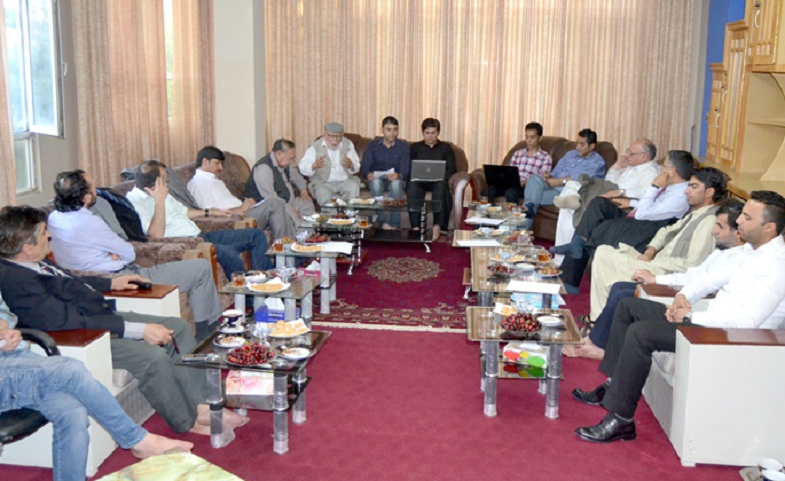AT-KABUL: Political and security affairs analysts tagged Pakistan’s policies towards Afghanistan as “dual and deceptive” and said the ties were more about geo-strategy than geo-economics as Afghan traders were forced to remain struck by bureaucratic hurdles in the neighboring country.
In a monthly gathering of the Rana Think Tank, the analysts said that if Islamabad was sincere and had economic interests in the region, it would have given same importance to Kabul’s aspirations for economic growth.
“Going through the pages of history, we will find that Afghan army was well-equipped and trained in the past, but was destroyed by the anti-Afghanistan forces. We know who did it. It was Pakistan,” said Pohand Jamdar, an analyst.
He termed policies of the world powers misleading while saying that regional and extra-regional actors had distributed power among different groups when the Soviet Union invaded Afghanistan. “Some of these groups even labeled the tanks used by Afghan security forces as communists in order to destroy the Afghan army. The then and current Prime Minister of Pakistan, Nawaz Sharif, hit the last nail. All this happened because Pakistan wants to annex Afghanistan and make it as its fifth province. At one time, there were speculations that Afghanistan would enter into confederation with Pakistan,” Jamdar opined.
He further said that international community has put pressure on Pakistan after Osama Bin Laden was killed in Abbottabad, but later the stance changed and they started supporting Pakistan “well” against Afghanistan.
Jamdar further said that politics all over the world is about “my enemy’s enemy is my friend.” He urged the Afghan government to adopt the same approach, adding, “Our neighbors will have concerns but what about our national interests. Pakistan was not allowing Afghan trucks in the past to pressurize Kabul. Our neighbors will have economic interests but they are not ready for economic friendship like European Union member countries. Our neighbors want something else.”
Speaking about policies of the key international players, he said that Britain was defeated three times in Afghanistan, and wanted revenge, therefore, landed its troops in areas where they were defeated in the past.
Regarding role of Afghan leaders in the current political developments, Jamdar said: “Our leaders do not tell the truth. They do not tell about the policies of foreign players regarding Afghanistan. The government that came into power has no resources to run the state’s affairs. Karzai denied signing the Bilateral Security Agreement (BSA), because he thought it will not bring peace. The current government believed that the agreement would help.”
The analyst went on to say that President Ashraf Ghani became close to Pakistan based on the new approach, but there is no clear plan or guarantees that the peace process would succeed.
The deal between ISI-NDS was aimed to bring Afghanistan under control of Pakistan. Islamabad knows that Afghan national army is united. The army that we have is of the view that Pakistan should not be allowed at any cost to influence it, he added.
When asked about AfPak ties reset, he said that Pakistan’s strategy about the Taliban is changing, and those who were against Islamabad were forced to leave the country.
Replying to another query, he said that Afghan government is saying the Taliban should be eliminated, but they are already dispersed and gone. “Now there is new phenomena called Daesh. Iran has also become active in Afghan politics. Tehran is ready to sign the nuclear deal with the United States and become closer to the west,” he said.
Danish Bakhtyari, an international affairs analyst, recalled that Hamid Karzai as president in his second term tried to bring different groups closer and seek their advice on important national matters. “In one of such meetings he said, keys to peaceful and stable Afghanistan are in the hands of Pakistan and the United States,” he said.
Dr. Yahya Wardak, another analyst, said that Afghan politics would continue to change and attract other regional players. He said that Russia never wanted the Britain to come close to its borders. “You will not see a big project on the other side of the Pamir. This is the factor that forced the US and British forces to have military bases in Kandahar and Helmand provinces, because they knew that Russia would not be welcoming if the troops were stationed in Afghan areas bordering the former Soviet Union states,” he pointed out.
He said that when Afghan government talks about neighbors, Pakistan is not the “only candidate” in the list, but there are other neighbors as well. “We shall look for economic opportunities in the other neighboring countries too to reduce reliance on Pakistani transit trade routes, because Afghanistan has its own strategic importance,” he suggested.
Yahya Wardak further said that most of the regional countries want to access the resources-rich Central Asian republics. He added that India’s investment in Iran’s Chahbahar Port is also part of this policy. “Pakistan is doing the same and already busy in expanding its roads network to Afghanistan.”
Other analysts commented that Afghanistan has geo-economic importance. They said that Pakistan is in the quest to turn Afghanistan into fifth province, because Islamabad has fixed eyes on the Central Asian countries. They said that this very idea of the “fifth province” was given by some Afghan leaders to Pakistan, though unintentionally.
“Our leaders said that General Hamid Gul [the former chief of ISI] should come to build an army for Afghanistan. Some Afghan leaders even said that a Pakistani official shall be hired at key post. Areas that belonged to Afghanistan had been occupied by Pakistan,” Jamdar said.
The analysts advised the government to be careful in dealing with Pakistan as Islamabad yet to stop supporting the insurgent groups that carry out attacks in Afghanistan. They said that Pakistan still to help the Afghan peace process and force the Taliban to renounce violence and sit at the negotiations’ table.
 Afghanistan Times
Afghanistan Times




